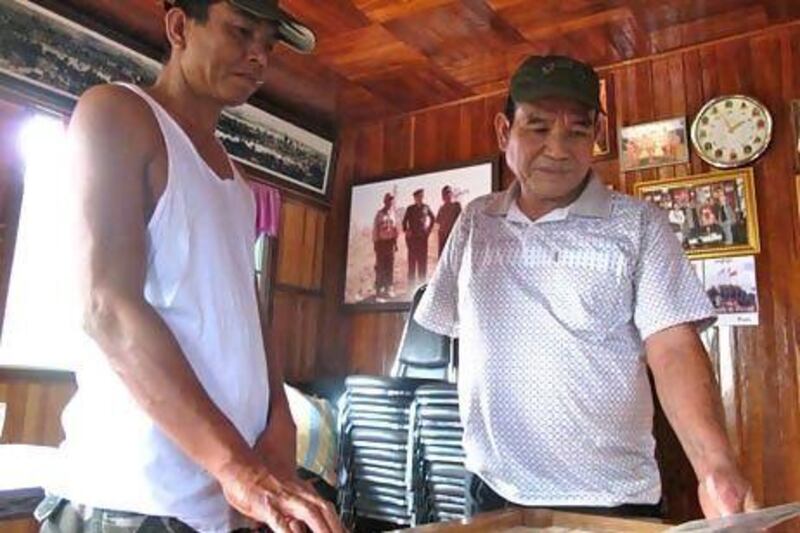SHAN STATE, MYANMAR // Ethnic minorities in Myanmar say it is dangerously premature for the international community to relax sanctions on the regime while the army continues to attack and abuse them.
In recent days, the EU, United States and several other countries have announced they are easing sanctions on Myanmar, formerly known as Burma, in praise of the democratic reforms that have taken place in the past year.
Since the appointment of President Thein Sein last February, censorship has eased and 500 political prisoners have been released. By-elections earlier this month saw an overwhelming victory for the party of reformer Aung Saan Suu Kyi.
But in the troubled border regions, ethnic minority groups tell a different story.
Divided by language and ethnicity from the lowland Burmese, groups such as the Karen, Kachin, Mon and Shan have long been denied the self-government promised them when the British left in 1948.
Decades of oppression by the Myanmar Army forced ethnic groups to establish rebel armies for protection.
Human-rights organisations have documented thousands of cases of torture, extrajudicial killings and systematic rapes by Myanmar soldiers, with little distinction between civilians and combatants.
"In southern Shan state alone, we recorded 400,000 forced relocations between 1996 and 1999," said Charm Tong, of the Shan Women's Action Network, a local NGO. "Rape and torture were systematically used by the army to demoralise, terrorise and control.
"Women were burnt alive. Mothers and daughters were raped at the same time."
The international community is keen to believe these conflicts are coming to an end. They have praised the "progress toward peace with ethnic groups", as Australian foreign minister Bob Carr put it.
But just as reforms were gathering speed last year, the Myanmar Army was actually stepping up its operations in ethnic areas, seeking control of regions where lucrative mining and development projects are coming up.
Rebels in Kachin state had been at peace for 17 years before the military attacked suddenly last June. A series of large Chinese dams and an oil pipeline are planned in the area.
A recent report by Human Rights Watch said 75,000 Kachin have been displaced by the fighting and the army has attacked Kachin villages, rased homes, pillaged properties, tortured civilians, raped women and conscripted forced labourers, including children as young as 14, on the front lines.
Other groups have signed fresh ceasefires in recent months, but there are serious doubts about whether they will hold.
Speaking in his wood-panelled office in the rebel headquarters of Loi Taileng, a mountain town on the border with Thailand, one rebel leader, General Sao Kur Guern, said little has changed since his army signed a ceasefire in December.
"Fighting has continued in some areas despite the ceasefire," said Gen Guern, district commander of the Shan State Army-South (SSA). "Where there is fighting, it is because the Burmese Army has violated the agreements."
He says government forces have refused to withdraw from areas designated in the agreement. Activists have documented the resupply and reinforcement of troops in those positions.
In February, a civilian officer of the SSA decided to take advantage of the ceasefire to go shopping in a town with his family. He was spotted by Burmese soldiers and apparently without provocation, they shot him and his wife dead in front of their young son.
Gen Kur Guern said this is one of at least 16 breaches of December's ceasefire.
"The regime is playing a game with the international community because it wants investment," he said. "Their money will be used to strengthen the military."
Shan leaders say they were willing to give President Sein's government a chance to prove it is committed to peace, but question whether the message of reform has trickled down to military leaders on the front line.
"We believe Thein Sein and Aung Saan Suu Kyi are trying to change things," said Philip Yawd Maung, a member of the foreign department of Restoration Council of Shan State, the SSA's political arm.
"But the military is not doing anything differently. The ceasefire could break today or tomorrow."
Most of Myanmar's ethnic rebels are still willing to take the risk. To the south in Karen state, political representatives of the local rebel army have just returned from what they say are productive talks with the president in the capital, Naypyidaw.
"To those who oppose a dialogue, I ask: 'Are you ready to keep sacrificing your children?' We have to start somewhere," said David Taw, executive member of the Karen National Union.
But even those with faith in the peace process say it is too early to start lifting sanctions.
"You cannot lift sanctions just because there have been some by-elections," said Mr Taw. "There needs to be international pressure to have independent monitoring of ceasefire areas."
Back in Kachin state, there seems little hope of a quick end to the fighting.
"The other groups are making very weak deals," said Patrick Zau Doi, foreign affairs liaison for the Kachin Independence Organisation. "We demand that troops are withdrawn and international monitors brought in before any deal is signed.
"The ceasefires are signed by the top levels of these organisations who are promised benefits. They are not really representing the needs of the people and do nothing to improve ethnic rights."
foreign.desk@thenational.ae





